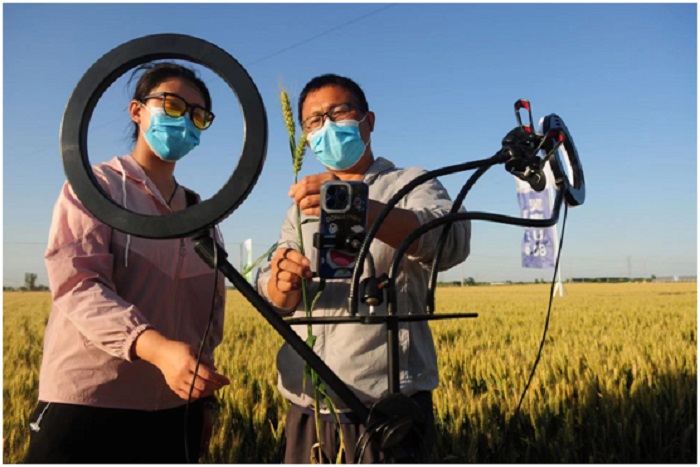



As the construction of digital villages gains momentum across China, a good number of young Chinese with digital technologies and Internet thinking, who define farmers of the new generation, actively join the development of agriculture and rural areas.
They host live streams in the fields and turn local specialties into best-selling goods on the Internet, employ Internet of Things (IoT) systems to improve field management, and remove obstacles hindering the transportation of farm produce through digital logistics platforms.
“I sold 400,000 yuan ($59,681) worth of homemade fermented bean curb once during a livestreaming show,” said Zeng Qinghuan, a young farmer from Xinhua county, Loudi city, central China’s Hunan province.
Live streams recording the girl doing farm work, going to the fair, and selling local specialties have won the young vlogger six million followers on a Chinese short video sharing platform. Through her camera, the agricultural and sideline products from her hometown have found favor with a large number of her followers.
Zeng’s e-commerce demonstration base is located in an ordinary farmhouse. It has different settings for making videos, livestreaming studios for promoting products of characteristic local industries, warehousing, refrigeration, packaging and logistics workshops, and multifunctional training rooms.
A live streamer training program has been launched here, which provides a month of free training for farmers and helps them gain prosperity through digital technologies.
Xinhua county has established 412 online stores and 2,885 shops for poverty alleviation on e-commerce platforms. Promoting the application of digital technologies and e-commerce to agriculture has become an important driver of the county’s economic growth, leverage for boosting rural vitalization, and a major force in promoting industrial development.
With keen Internet thinking and market-oriented insights, young farmers have explored new business forms in the agricultural sector, enhanced driving forces for rural development, and injected new vitality into the transformation of traditional agriculture.
At an industrial park of Hu sheep, a species native to Huzhou city, east China’s Zhejiang province, in Lyushan township, Changxing county, Huzhou, Wang Chenchen, a young shepherd born in the late 1990s, uses remote sensing technology to monitor in real-time the number of sheep, their feed, as well as environmental factors like humidity and temperature in the sheep barn, making it possible for one person to raise 3,000 sheep easily.
After repeated experiments, Hunan girl Mo Xiaoyu and the engineers in her team turned nearly 270 water outlets in an experimental cotton field in Yuli county, northwest China’s Xinjiang Uygur autonomous region, into intelligent electric irrigation outlets and equipped the field with advanced automatic fertilization and irrigation machines, realizing remote fertilization and irrigation at specific times and designated points.
During this year’s spring ploughing, Anren county, Hunan, a major grain-producing area in China, developed a program to integrate and match agricultural machinery resources with the needs of farmers, enabling grain growers in need of agricultural machinery to place orders and contact nearby providers online.
Big data, 5G, artificial intelligence (AI), IoT and other digital technologies have become indispensable “farm tools” for farmers in new generations, thanks to the rapid development of information infrastructure construction in rural areas.
Data from the China Internet Network Information Center suggest that all administrative villages in China had been connected to broadband Internet services as of the end of 2021, while 57.6 percent of the people living in rural areas had access to the Internet and the number of rural netizens had reached 284 million in China.
In February, Chinese authorities issued a circular on comprehensively pushing ahead with the key tasks for rural vitalization, which stressed that the country should vigorously promote digital village construction by advancing smart agriculture, driving the integrated application of information technology, agricultural machinery and agronomy technologies, and improving farmers’ skill on digital technologies.
People in rural areas are enthusiastic about making innovations and starting new businesses related to digital village construction, according to Hong Yong, an associate research fellow at the e-commerce institute of the Chinese Academy of International Trade and Economic Cooperation, Ministry of Commerce.
New generation farmers have actively employed e-commerce, livestreaming and other business models to promote agricultural products, facilitated local employment and cultivated regional brands of farm products, contributing to the realization of rural vitalization and common prosperity, Hong noted.
To motivate more people to start businesses in rural areas, China will roll out targeted policies to encourage entrepreneurship and intensify support for training, according to Hong. By sending experts to rural areas to give lectures and organizing live-streamed classes, the country will provide its new generation farmers with easier access to professional expertise in Internet marketing, farming skills, etc., Hong said.


Senator Chuka Utazi who represented Enugu.


An Abuja based Legal Practitioner, Ugochukwu.


The African business community in Yiwu,.


Anti – kidnapping, Human Trafficking, Child.


The All Farmers’ Association of Nigeria.


The police on Tuesday arraigned a.


As part of measures to further.


Presidential Support C’ttee hails Ganduje’s emergence.


In response to the impact of.
A prayer group in Nigeria under.
Leave a Comment